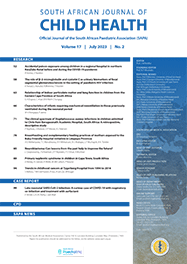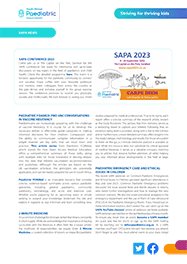Research

Placental malaria and neonatal anti-tetanus antibody status: any association?
Abstract
Background. Neonatal tetanus(NT) has remained an important cause of neonatal morbidity and mortality in the tropics where high prevalence of placental malaria coexists. The current strategy for the control of NT involves stimulating production of protective level of anti-tetanus antibody in the mother, through tetanus toxoid immunization, and transferring same through the placental to the foetus. Placental malaria is known to alter the morphology and functions of the placenta, but the effect on transfer of anti-tetanus antibody specifically, remains unsettled. We studied the influence of placental malaria on transplacental transfer of anti-tetanus antibodies among mother-infant pairs at the University of Maiduguri Teaching Hospital North-Eastern Nigeria.
Method. Maternal and cord blood samples were collected from 162 mother-baby pair and analysed for anti-tetanus antibody levels using ELISA. Placental biopsy was also taken from each mother-baby pair and placental malaria diagnosed histologically.
Results. One hundred and sixteen (71.6%) of the 162 mother-infant pairs were positive for placental malaria out of which 59(50.9%) had chronic-active, 44 (37.9%) acute and 13 (11.2%) had past placental malaria. Forty-one (25.3%) babies were classified as seronegative for tetanus antibodies of whom 32 were delivered to mothers who were positive for placental malaria. Fifty-six (34.5%) mother-infant pairs had poor placental transfer for tetanus antibodies as signified by cord-maternal ratio of < 1.0 antibodies, out of these, 40 (24.7%) were positive for placental malaria. There was statistically significant association between type of placental malaria and serostatus (p = 0.0009) and efficiency of placental transfer (p = 0.0340). Mothers with chronic-active malaria were 7.4 times more likely to deliver a seronegative infant compared to mothers with acute malaria (p = 0.0002, OR =7.353, 95% CI = 2.327 -23.25). Similarly, maternal-infant pair with chronic-active malaria were 2.9 times more likely to have inefficient placental transfer (p = 0.0221, OR = 2.859, 95% CI = 1.200 – 6,859).
Conclusion. Placental malaria has remained a very common medical condition in Maiduguri among pregnant women and may partly account for the high level of neonatal tetanus prevalent in the area.
Authors' affiliations
Muhammad Faruk Bashir,
Hassan Abdullahi Elechi, University of Maiduguri
Mohammed Garba Ashir, University of Maiduguri
Adamu Ibrahim Rabasa, University of Maiduguri
Alhaji Bukar Musa, University of Maiduguri
Randolph Tartenger Akuhwa, University of Maiduguri
Abubakar Garba Farouk, University of Maiduguri
Full Text
Cite this article
Article History
Date published: 2017-12-22
Article Views
Full text views: 1085

.jpg)



Comments on this article
*Read our policy for posting comments here